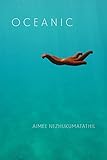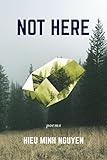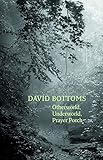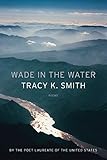Here are seven notable books of poetry publishing in April.
Eye Level by Jenny Xie
An excellent debut. Xie is particularly gifted with precise description; I want to linger on these poems. “Phnom Penh Diptych: Wet Season” is masterful and patient, expansive without becoming lost. She moves through this city “of a million young faces,” where there’s “new money lapping at these streets.” “In the backseat of a gold Lexus / a minister’s son lies, his eyes shut / dumb with honeyed sleep.” More: “slack lips of suitcases, lukewarm showers up to three times in a day. / Mosquito bites on the arms and thighs, patterned like pips on dice.” At night: “Alley of sex workers, tinny folk songs pushed through speakers. / Karaoke bars bracketed by vendors hawking salted crickets.” Eye Level puts us there, with Xie’s sight. Her poems that span pages are nestled between single-stanza songs; consider the tightness of “Naturalization”: “It is 1992. Weekends, we paw at cheap / silverware at yard sales. I am told by mother / to keep our telephone number close, / my beaded coin purse closer.” Her grandmother “prays for fortune / to keep us around and on a short leash. / The new country is ill fitting, lined / with cheap polyester, soiled at the sleeves.” She also steps back and settles in, as in “Solitude Study”: “I know we can hold more in us than we do / because the body is without core.” And “Inwardly”: “We have language for what is within reach / but not the mutable form behind it. // Or else, why write.”
 Negative Space by Luljeta Lleshanaku (translated by Ani Gjika)
Negative Space by Luljeta Lleshanaku (translated by Ani Gjika)
The narrator’s memories in “Almost Yesterday” begin this book. The midday sight of her father and mother “coming out of the barn / tidying their tangled hair in a hurry, / both flushes, looking around in fear / like two thieves.” Even now, she remembers the barn clearly; after all, “You cannot easily forget what you watch with one closed eye, / the death of the hero in the film, / or your first eclipse of the sun.” Negative Space is flush with wonderfully melancholic stanzas. “When a child is born, we name it after an ancestor, / and so the recycling continues. Not out of nostalgia, / but from our fear of the unknown.” “Where I come from, / there’s only one word for ‘grief’ and for ‘water’ / and both take the form of the containers that hold them: / each to their own fate, each to their own grief.” The title poem holds the scars of the Albanian Cultural Revolution. Churches were sacked. Crosses “were plucked from graves.” Icons and bibles were burned: “Witness stepped further back, / as if looking at love letters / nobody dared to claim.” Lleshanaku has a dizzying talent of capturing our notes of destruction. “And what could replace Sunday mass now?” the narrator wonders. “Nails in worn out shoes exposed stigmata / that bled in the wrong places— / a new code of sanctification, / of man, by man.”
 Strange Children by Dan Brady
Strange Children by Dan Brady
Brady’s debut opens with the dizzy, entrancing “Stroke Diary,” stanzas sifted across pages. The narrator’s wife, a few days after having their child, has a stroke. “Our life together, / like a great whale // breaching, or rather / as fast as a fish // picks a single fly / from the river water.” Shaken and wounded, the family emerges, but the stroke’s shadow holds. A trip to the cardiologist comes with a warning: “Given the risk of recurrence, / you shouldn’t get pregnant again.” Strange Children considers what happens when the certainty of our plans is replaced with a strangely comforting doubt. They wait for news about their adoption request, and the results are inspiring, among shaken lives: “I have lived a thousand lives / with these children and the grief / and joy of each one is a blessing to me.”
 Oceanic by Aimee Nezhukumatathil
Oceanic by Aimee Nezhukumatathil
There are so many reasons to return to Nezhukumatathil’s poems—her affinity for the natural world, her ability to write a love poem that truly works, her humor that surprises and salves—and Oceanic reminds me of yet another: how she can offer readers so many routes within a single poem. “Love in the Time of Swine Flu” begins “Because we think I might have it, / you take the couch.” It’s a real change: “I can count on one hand / the times we have ever slept apart / under the same roof in our five years.” Two sick parents won’t work for a small son. What’s more, the narrator is pregnant: “I carry / a small grapefruit, a second son, inside me.” They are separated by only a room, but, “In bed, I fever for your strong calves, your nightsong breath on my neck.” He comes back to bed: “We decide it is worth it.” And how she ends this poem: “The child still forming / inside me fevers for quiet, the silence of the after, / the silence of cell-bloom within our blood.” Poets are reared to be strong closers, but I’d venture that Nezhukumatathil is the best: throughout Oceanic, we get the sense these poems have been felt through, spoken through, and paced to a precise beat. In “Letter to the Northern Lights,” she ends “I’d rather share sunrise with him and loon call // over the lake with him, the slap of shoreline threaded / through screen windows with him—my heart // slamming in my chest, against my shirt—a kind / of kindling you’d never be able to light on your own.” Added bonus: Nezhukumatathil’s poems will remind you (as did Gerard Manley Hopkins and Elizabeth Bishop) that wonder is a gift, and great words can get us there.
 Not Here by Hieu Minh Nguyen
Not Here by Hieu Minh Nguyen
“I’m always surprised how efficiently // regret can build a machine, a geared thing // charging through the narrow halls of your memory.” Not Here is a book of past pain bled into the present; of youth scenes that remain. In the powerful “Again, Let Me Tell You What I Know About Trust,” the narrator’s father, confronted with his cheating, “slapped my mother, came to my room, threw my sleeping body / over his shoulder, & drove off.” There’s a fine shade of complexity at work in his poetics. “Who wouldn’t / beg for a story like this? A story to point & run toward / when asked to explain every decision you’ve ever made / regarding love. A story to blame when your hands rush / toward the exit.” Other stories in this book route toward the narrator’s mother, how “for the longest time, she knelt in front of a shrine & asked // to be blessed with a daughter & here I am: the wrong / monster; truck stop prom queen in his dirt gown.” In Not Here, bodies are imperfect works, subject to doubt, desire, and decay—in equal parts. “Standing in front of a mirror, my mother tells me she is ugly / says the medication is making her fat.” The son sees the mother “pull at her body & it is mine.” After all, “I truly wanted to be beautiful / for her.” In his dreams, he is thin: “I tell my mother she is still beautiful & she laughs. The room fills / with flies. They gather in the shape of a small boy. They lead her / back to the mirror, but my reflection is still there.”
 Otherworld, Underworld, Prayer Porch by David Bottoms
Otherworld, Underworld, Prayer Porch by David Bottoms
These poems live in the soft hours of late night and early morning. When a narrator takes out his dog “to piss in the yard” and the “bird feeders standing in the smudged shadows / of the maples / look like human skulls impaled on poles.” Or nights when the “trees on the bank are black and soundless, / a fat wall of darkness, / and the silence on the water feels like the voice / of a great absence.” His characters are a bit older. They’re content to listen, and to wait: “Nobody even bothered / to untangle the backlashed reel.” Bottoms’s poems are like dark rooms: we enter and exit through the same door, but we’re a little different on the way out—as with “My Old Man’s Homemade Dagger.” The narrator finds his father’s high school metal shop dagger: “bone handle, / blade cut from a metal file.” His father admonishes him to put it back in a desk, and he does, “but have held it for years in my memory, / just as he must’ve held it / in that desk drawer of rusted sockets and wrenches— // ugly, yes, but one of those things / so well made we could hardly let it go.” I’ve already gone back to the title poem a few times, and its wonder about death: “Maybe we rise again only to the good things—honeysuckle, / robins, mockingbirds, doves, / fireflies toward evening, and along the back fence // the steady harping of tree frogs. / On the prayer porch, among the icons, such fancy notions.”
 Wade in the Water by Tracy K. Smith
Wade in the Water by Tracy K. Smith
Smith, who is set to begin her second term as America’s poet laureate, recently said that she “felt from an early age that poetry was something mysterious, something playful and lilting. As I got older, poems began to offer me new and life-changing ways of looking at the familiar world.” We are in good worlds with Smith leading the poetic charge, as Wade in the Water attests. What range: poems crafted from letters and statements of African Americans enlisted in the Civil War. Poems about motherhood, like “Annunciation:” a narrator tired of roads, bridges, steel, and lights: “Everything enhanced, rehearsed, / A trick.” She longs to feel, to be “confronted by the real, / By the cold, the pitiless, the bleak.” She ponders her son, “eyes set / At an indeterminate distance, / Ears locked, tuned inward, caught / In some music only he has ever heard.” Poems like “The Angels,” “Two slung themselves across chairs / Once in my motel room. Grizzled, / In leather biker gear. Emissaries / For something I needed to see.” They smell of “rum and gasoline,” and “one’s teeth / Were ground down almost to nubs.” But she feels guilty: “Think of the toil we must cost them, / One scaled perfectly to eternity. / And still, they come, telling us / Through the ages not to fear.” She never sees the angels again, but catches “sightings, flashes, hints” of them. A tree in the sun, wind swaying its branches. The strength of rain. The grace in a tired world.
The post Must-Read Poetry: April 2018 appeared first on The Millions.
from The Millions https://ift.tt/2IocE6u
Comments
Post a Comment